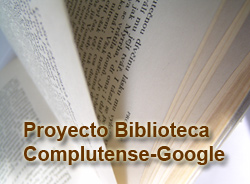 The Complutense University of Madrid is the latest library to join Google’s digitization project, offering public domain works from its collection of more than 3 million volumes. Most of the books to be scanned will be in Spanish, as well as other European languages (read more in Reuters , or at the Biblioteca Complutense (en espagnol)). I also recently came across news that Google is seeking commercial partnerships with english-language publishers in India.
The Complutense University of Madrid is the latest library to join Google’s digitization project, offering public domain works from its collection of more than 3 million volumes. Most of the books to be scanned will be in Spanish, as well as other European languages (read more in Reuters , or at the Biblioteca Complutense (en espagnol)). I also recently came across news that Google is seeking commercial partnerships with english-language publishers in India.
While celebrating the fact that these books will be online (and presumably downloadable in Google’s shoddy, unsearchable PDF editions), we should consider some of the dynamics underlying the migration of the world’s libraries and publishing houses to the supposedly placeless place we inhabit, the web.
No doubt, Google’s scanners are aquiring an increasingly global reach, but digitization is a double-edged process. Think about the scanner. A photographic technology, it captures images and freezes states. What Google is doing is essentially photographing the world’s libraries and preparing the ultimate slideshow of human knowledge, the sequence and combination of the slides to be determined each time by the queries of each reader.
But perhaps Google’s scanners, in their dutifully accurate way, are in effect cloning existing arrangements of knowledge, preserving cultural trade deficits, and reinforcing the flow of knowledge power — all things we should be questioning at a time when new technologies have the potential to jigger old equations.
With Complutense on board, we see a familiar pyramid taking shape. Spanish takes its place below English in the global language hierarchy. Others will soon follow, completing this facsimile of the existing order.
if:book
A Project of the Institute for the Future of the Book

Ben says, “But perhaps Google’s scanners, in their dutifully accurate way, are in effect cloning existing arrangements of knowledge, preserving cultural trade deficits, and reinforcing the flow of knowledge power — all things we should be questioning at a time when new technologies have the potential to jigger old equations.”
How exactly is Google doing this? I agree that it a good time to question our assumptions of the world, but which of the cultural deficits do you think are being copied with this project?
Just of the top of my head I can think of a few possible examples:
1) Copyright laws restrict flow of information.
3) Governments and laws restrict access to specific kinds of works to people.
3) Poor and underfunded schools and libraries have limited access to new, updated or rare books.
4) The privileged status-quo is preserved by the cost to access work
These examples are all going through radical changes right now. And Google has been a crucial and influential part in all of these issues. Many disagree with some of Google’s positions, like providing censored search results to China’s citizens, but the discussion is active, especially on this blog.
Adding 3 million volumes of public domain works in Spanish, to me, sounds like one of better deals. Is there a new issue that you think that this partnership between the Google and Complutense University of Madrid brings up?